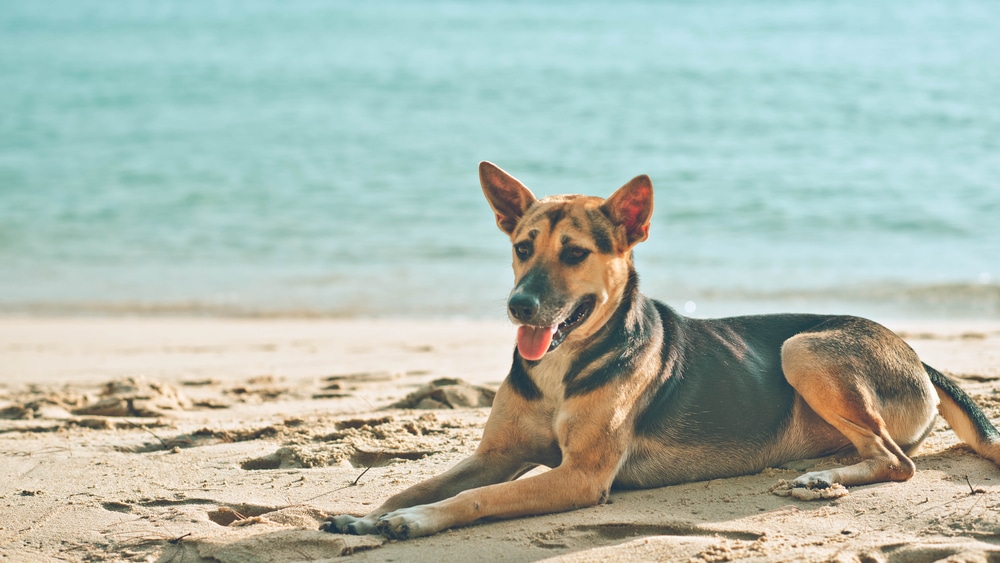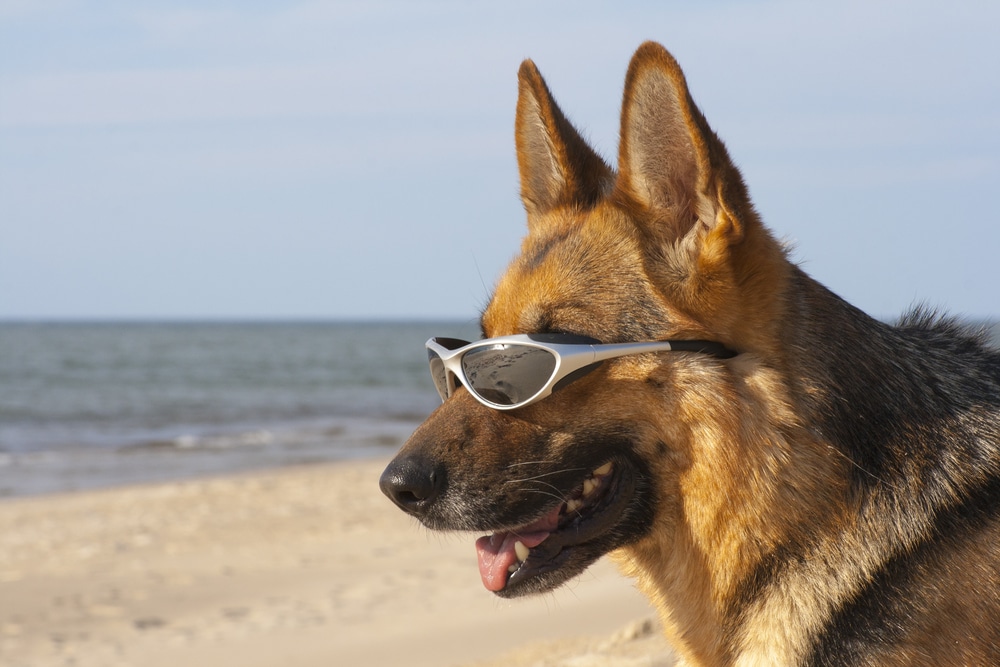It’s the summer, and we are all hot. This includes our dogs. Maybe you even own a Samoyed! But do dogs also get sunburned?
Dogs, like humans, can get sunburned. Just like us, our head is protected by the hair, and our body we protect with clothes or sunscreen. For dogs, that is their fur. Without it, they would most certainly get sunburns, and even worse, they can have heatstroke, which is life-threatening. Always contact your vet if you’re concerned about your dog.
Table of Contents
How Do Dogs Get Sunburns?
Owners often spot their dogs lying in the sun. This is okay if they have a place to move once they feel warm enough. But some dogs are prone to sunburns because there are days of the year when the UV coming from the sun is strong enough to cause damage to the skin cells, even in a couple of hours.
It doesn’t have to be very hot for a dog to get sunburned, either. Many folks have gotten sunburned in the winter, for example. The same happens to dogs that go out for a hike or for a swim with their owners.
What Dogs Are More Prone To Sunburns?
These are the dogs to especially keep an eye on when it comes to getting sunburned.
Dogs Without Fur
This does not come as a surprise as the Xoloitzcuintle breed, the Chinese crested, and the American hairless dog are among the breeds most likely to get sunburned. They do not have any form of protection from the sun because they do not have any fur.
Short-Haired Breeds Of Dogs
Even breeds that are short-haired are prone to get sunburned, such as dalmatians, dachshunds, and bull terriers.
Dogs Whose Skin Is Pale Pink
If these dogs lose their fur or have very little fur, they can get more easily sunburned than other dogs.
Any Dog With Consistent Sun Exposure
In general, every dog that is constantly exposed to the sun is more likely to get a sunburn, especially if they have other conditions such as hormonal disbalance, immune-mediated disease like lupus
What Are The Symptoms Of Dogs That Have Sunburns?
It is important to be aware of the symptoms of sunburn because it allows you to react quickly to prevent further issues. Here is a list of several things that you need to watch out for. If you notice any of them, contact your vet as soon as possible.
The Skin Is Turning Pink And Red
Just as when we get sunburned, dogs show the same signs on their skin in terms of the color it takes on.
The Skin Becomes Dry
Just the same as in humans, after a dog’s skin is sunburned, it will become dry. The reason for this is due to the damage to the layers. The skin loses its moisture, and it may become flakey, in fact.
Even though sunburns usually are not that painful, dogs being dogs, tend to chew and scratch, which could further damage the delicate skin and speed up the development of a bacterial infection.
Formation Of Blisters
If you see a blister on your dog’s skin, it can mean a moderate degree of damage from the sun. Blisters can pop on their own or the dog can do it itself when they are itching. However, if by any chance the blisters are filled with yellowish pus-like stuff, then you definitely need to contact your vet.
Fever
Dogs could develop a fever when getting sunburned too.
Not Eating Or Drinking
If you notice this for any reason, let alone your dog getting sunburned, definitely take them to the vet right away.
How To Treat A Sunburned Dog?
Here’s what you can do if your dog gets sunburned.
Cool Water And Compress
If your dog has a mild sunburn, you can try and use some cool water and a compress on the sunburned area. Continue holding the cool compress until you see some relief in the dog.
Try Using Aloe Vera
Aloe vera is also something that is recommended when people have sunburns too, which is why it is good for your dog as well. However, you need to be able to stop your dog from licking it because aloe vera can cause some gastrointestinal problems, and if the dog licks it, it won’t work.
Zinc-Based Ointments Or Creams
Consult your vet about if there is anything available for pets in terms of creams or ointments. Zinc helps lower inflammation as well as irritation. It also has some antiseptic properties, which is why it is recommended for sunburns too.
Can Sunburn Be Prevented?

Sunburn can be prevented. Let’s start with being aware of the sun’s intensity.
Knowing When The Sun Is Most Intense
The first thing to do is avoid walking your dog when the sun shines the strongest. Not only are you protecting yourself from being sunburned, you are also protecting the dog too. If your dog lives outside, make sure there is plenty of shade where it can retreat and sleep through the hot period of the day as well.
Protection Products
Even though it may sound crazy, there are products for sun protection for dogs too! If you are an adventurer who loves to take their dog with them, make sure to pack their sunscreen as well! And make sure they don’t have alcohol!
Monitor Your Dog
After every walk, give your dog a good check-up. It never hurts to be on the safe side. If anything seems out of the ordinary, contact your vet
Conclusion: Do Dogs Get Sunburned?
Dogs are prone to sunburns and even need protection like we do. No one wants to see their pooch in pain, so next time you are considering some outdoor activities, think about how they could affect your dog as well!
So, how will you protect your dog from getting sunburned? Let us know in the comments below!
